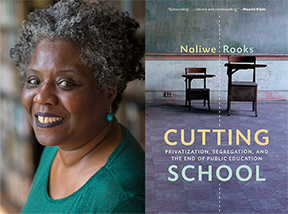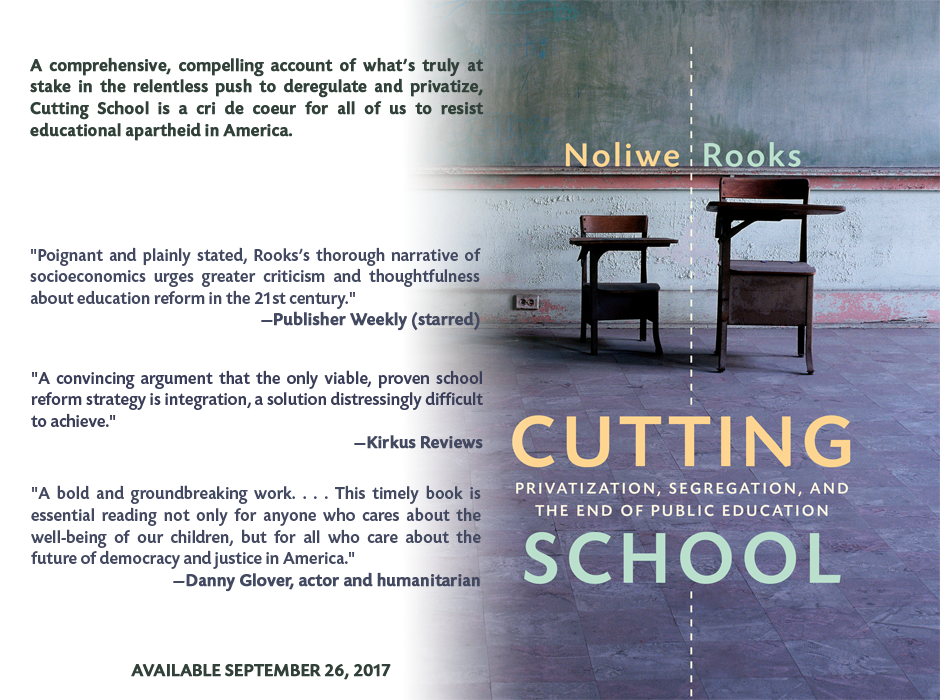Privatization and Segregation of U.S. Public Education Endangers Democracy
Interview with Noliwe Rooks, author and director of American studies at Cornell University, conducted by Scott Harris

Randi Weingarten, who leads the 1.6 million-member American Federation of Teachers union declared in August that President Trump’s Education Secretary, Betsy DeVos, “is the most ideological anti-public education person to ever be nominated or confirmed to that position.” DeVos, who never attended public school or worked in one, has devoted her life to allowing parents to choose the schools their children attend, either charter or private schools using public funds – and decreasing the federal government’s role in education.
DeVos bankrolled a ballot measure in Michigan to create a private school voucher system that was defeated by a two-to-one margin. She then spent millions of dollars of her own money to elect legislators who then made deep cuts to public school budgets and promoted unaccountable for-profit charter schools in the state. Now almost half of Michigan’s charter schools rank near the bottom of U.S. schools, and Michigan dropped from 28th to 41st in reading, and from 27th to 42nd in math compared with other states.
Between The Lines’ Scott Harris spoke with Noliwe Rooks, director of American studies at Cornell University, who talks about her new book “Cutting School: Privatization, Segregation and the End of Public Education.” She is an associate professor in Africana Studies and Feminist, Gender, Sexuality Studies.
Here, Rooks condemns school privatization efforts and contends that publicly-funded schools are essential to quality, equal education for all – and an indispensable element to build a democratic society.
NOLIWE ROOKS: Taxpayer-supported public education starts for the entire country. It had been in certain parts of the East Coast, in Massachusetts in particular, from the 1600s. But it’s really post-Reconstruction that the rest of the country gets with the idea of you know, we should use taxpayer dollars to educate all of our citizens regardless of wealth. Before 1890 to 1920, that period, education was really something only for the very wealthy. It was mostly private, you know, people were sent to Europe. They were sent to private boarding school. In the U.S., the idea of educating the masses of Americans really is a kind of quintessentially American intervention – that no matter who you are, no matter your social status, there’s something about education that would be valuable for you. And this is a way that we can start to educate all Americans around what citizenship means. That we can define a particular kind of civic imagination and a goal of democracy of what kinds of citizens we want to participate in this experiment in democracy where you know, voters, where everyone, where citizens of the country are engaging in setting the policy and setting the direction. That was the ideal.
BETWEEN THE LINES: When we see the drive toward privatizing our education system in this country through charter schools, the movement toward school vouchers, the whole notion of school choice which underlines those in a system called “virtual education” – tell us about how that affects the quality of education. These companies obviously are in it to make a buck. They’re making profit here, by getting into privatizing the education system. But what’s the effect on the students?
NOLIWE ROOKS: So, one of the terms that I came up with to talk about this moment, where we really do have an unprecedented move towards dismantling what we consider traditional public education. What that’s being replaced by – with high concentrations of poor people and high concentrations of people of color – are charter schools, which are Continue reading: Privatization and Segregation of U.S. Public Education Endangers Democracy - BTL

Noliwe Rooks at the Schomburg Center | The New Press - https://thenewpress.com/node/12217
Noliwe Rooks
Noliwe Rooks is the director of American studies at Cornell University and was for ten years the associate director of African American studies at Princeton University. She is the author of White Money/Black Power, Hair Raising, and Cutting School (The New Press). She lives in Ithaca, New York.




